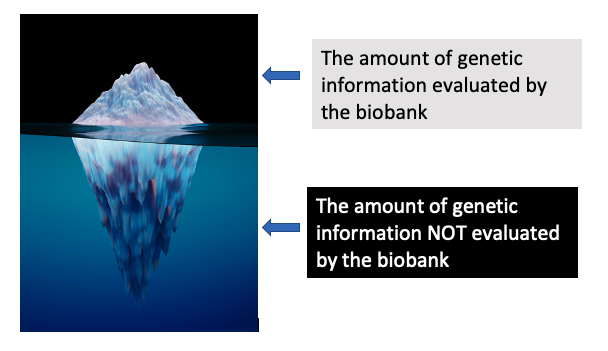Disease Risk
Results that may predict your risk for some diseases
Only 2-3 people out of 100 (2-3%) who take part in the biobank research study are expected to have a variation (also called a mutation) in their genes linked to a higher risk for developing disease. These genetic variations may cause a higher than average risk for cancer or a heart condition, or cause a rare genetic condition.
It is important to remember that if you are not contacted by the biobank, it does NOT mean that you don’t have a genetic variation that may increase risk for the conditions listed below!
The biobank genetic tests do NOT look for all genetic variations in these genes. In addition, there are many other genes associated with diseases like cancer and heart disease that are not tested for by the biobank.
If you are concerned about your or your family’s health history, you should talk to your doctor about a more complete genetic test or evaluation. The biobank genetic test is not as complete as genetic tests ordered by a medical professional.


Hereditary Cancer
Half of all men and one third of all women in the US will develop cancer in their lifetime. Most of these are not due to inherited genetic variants (also called mutations). Genetic testing can identify those who have a higher risk for cancer based on an inherited genetic variant. This information can help guide early detection and cancer prevention. It can also be a tool for families to understand who else in the family may have a higher than average risk for cancer.

Heart Conditions
About 33% of adults in the US will develop heart disease, and often this is NOT due to an underlying genetic risk. In some cases, heart disease can be due to inherited genetic variants (also called mutations). Some of these conditions can cause sudden cardiac arrest or aneurysms in young, seemingly healthy individuals. Genetic testing can help some better understand their risks and give doctors information to make a medical management plan.

Rare Genetic Conditions
The biobank will look for a few rare genes that are not linked to cancer or cardiac health, but could impact your health and your doctor’s medical management recommendations. However, most rare genetic conditions are not included in the test done by the biobank. Click on the link below for a list of genetic conditions and related genes included in the biobank testing. Note the biobank test does not look for all genetic variants (also called mutations) in these genes.